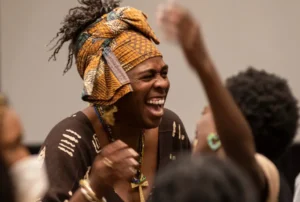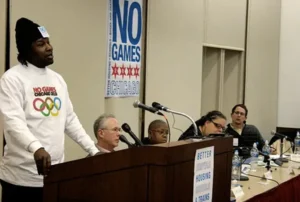August 28, 2013; Sunshine State News
The speeches went on, the agenda started to fall behind, and at the last minute, Philip Agnew, the executive director of Dream Defenders, the organization that led a 31-day sit-in at the Florida state capitol in Tallahassee was cut off the list of official speakers at the last moment—as he waited to join famous civil rights leaders, politicians, and Hollywood stars to speak at the Lincoln Memorial during the celebration of the 50th anniversary of March on Washington.
Amidst all the big name people, Agnew and his Dream Defenders represented the new young activist part of the racial justice movement that has sprung to life in the wake of the killing of Trayvon Martin under the color of Florida’s “stand-your-ground” law. Graciously, Agnew didn’t bemoan his exclusion from the mic: “This isn’t an opportunity to talk about what didn’t happen, but what will happen,” he said. “We’re very excited about the opportunity.” He also tweeted, “We won’t use this as an opportunity to widen any divisions…Youth will rise. Our time is now.”
Agnew wasn’t the only youth leader bumped from the agenda at the last moment: Sofia Campos, head of the United We Dream campaign (often simply called “DREAMers”), also lost her speaking slot.
Sign up for our free newsletters
Subscribe to NPQ's newsletters to have our top stories delivered directly to your inbox.
By signing up, you agree to our privacy policy and terms of use, and to receive messages from NPQ and our partners.
Was this the old-guard not quite getting the importance of young leaders like Agnew and Campos as the next generation of civil rights activists? Perhaps, but they weren’t the only people to lose their slots on the agenda. Someone on the Dream Defenders Facebook page noted that the wonderful labor leader, Dolores Huerta, was also bumped. Agnew did get two minutes for a presentation at the march held on August 24th, so he and the Defenders weren’t totally excluded from the 50th anniversary program—just not on the actual 50th anniversary of Rev. King’s “I have a dream speech” and not on a program that included three presidents of the United States.
Writing for Truthout, James Ceronsky described the Millennial civil rights leaders like Agnew as “(t)he elephant on the Mall…the so-called next generation of civil rights activists, who were noted by many speakers but had only a handful of speeches to themselves.” Ceronsky cited MSNBC news host Al Sharpton’s statement about the young activists that “If we told them who they could be and what they could do, they would pull up their pants and get to work,” as “mirror(ing) the who’s-who, old-guard slant of the march,” their sense that young people are waiting to be organized rather than functioning, like the Defenders and the DREAMers, “as agents of political change who, long predating the march, have been at work resisting voter suppression laws, Stand Your Ground, incarceration, detention and austerity through base building and direct action.” On MSNBC, Chris Hayes characterized Agnew and the “incredible dreamers movement” as reflecting “a real moral force…[that] we’re seeing in this younger generation right now.”
Writing for The Root, Corey Dade described the treatment of Agnew and Campos as a “snub”. Agnew has apparently already filmed his undelivered speech and posted it on YouTube. The cancellation of Agnew’s speech has sparked a vibrant Twitter discussion under the #ourmarch, with commentators criticizing speakers’ repeated reference to “youth leaders” to describe Defenders and DREAMers, sort of a subtle disparaging of activists who should really be considered leaders in their own right.
Social justice advocates are generally effusive regarding the importance of young people, Millennials, in the movement for social change. But is the old-guard really willing to step back and let this generation of leaders demonstrate what, 50 years ago, these oldsters themselves demonstrated as leaders of groups like the Student Nonviolent Coordinating Committee who were among the leaders of the Freedom Riders and of the Selma-to-Montgomery marches, including the infamous “Bloody Sunday” beating at Selma’s Edmund Pettus Bridge? It’s sometimes hard to let go, but honestly, wouldn’t it have been better to have heard from Agnew and Campos instead of, in the case of Agnew, the ubiquitousAl Sharpton once more time (Sharpton, according to The Root, became the speaker as Agnew’s name appeared on screens as the next speaker).












